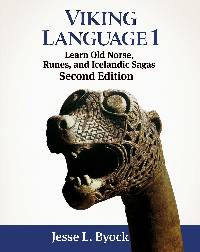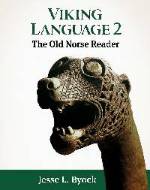Studies in Medieval and Renaissance Teaching (SMART)
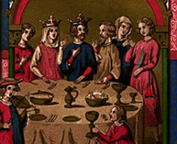
The Camelot Project at the University of Rochester is an online database of Arthurian texts, images,
bibliographies, basic information, and frequently asked questions about the Arthurian
legends. The project, begun in 1995, is sponsored by the University of Rochester and
prepared in The Robbins Library, a branch of Rush Rhees Library. The Camelot Project
has been created by Alan Lupack, Director of the Robbins Library, and Barbara Tepa
Lupack.
The Chaucer MetaPage was initiated at the 33rd International Congress on Medieval Studies by a group of medievalists interested in promoting Chaucer studies on the World Wide Web. Its aims are to organize and provide navigation aids for Chaucer resources on the Web, to work toward enhancing and extending those resources, and to encourage Chaucer studies, including those undertaken via "distance learning," at all levels of education. It also includes a link to help beginners learn the basics of pronouncing and understanding Chaucer's Middle English. A few of the site links follow below.
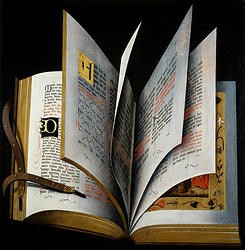
Baragona's Literary Resources, by Alan Baragona of the Virginia Military Institute, Lexington, Virginia, offers
useful links with informative annotations. Links are listed in several sections, including
Baragona's Chaucer Page, Chaucer Audio Files, Arthurian Legend, Medieval Drama, Beowulf and Old English Literature, Resources for the Study of Dante, some Versions of Hamlet, and Shakespeare and the Renaissance: General Resources.
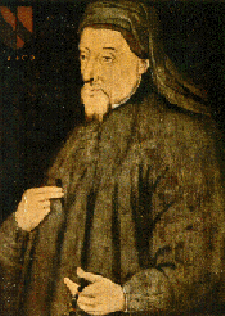
The Harvard Geoffrey Chaucer Page by Larry Benson, is most useful to the serious student who has focused on a particular
topic or tale. The site is incredibly rich: Chaucer's language and life, background
information on the types and occupations of the General Prologue, background information,
and sources and analogues to The Canterbury Tales. An impressive feature is the site index, which links to hundreds of primary and
secondary sources on, about, or relating to Chaucer and his times.

The Chaucer Page, by Edwin Duncan of Towson University in Maryland, is especially useful to Chaucer
beginners and provides a wide variety of links in conjunction with his Chaucer course.
In addition to both Chaucer-specific and general research aids, the site links to
many versions of Chaucer's work, several in modernized language or spelling. This
site also links to other very accessible, helpful Web pages.
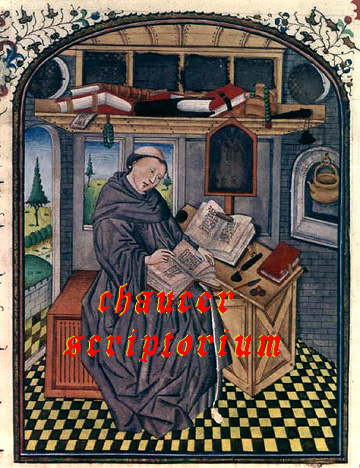
Chaucer Scriptorium, by Michael Hanly, is the Washington State University Chaucer and medieval literature
cyber-center for classes at all levels and welcomes all scholars and students who
find something useful here. "Michael Hanly . . . has compiled a collection of selected,
useful links to such areas as Medieval Texts and Images, Chaucer and Middle English
Literature, Bible Research, and information concerning the Catholic Church. The site
is most notable, however, for Hanly's original material, which is organized into four
sub-pages: "Some Interesting and Essential Stuff"; a very brief, useful 14th-century
outline; a sizable bibliography of print sources; and an annotated bibliography. This
last sub-page actually consists of links to 17 detailed outlines that Hanly's graduate
students did of various articles on Chaucer. Hanly's original material is a good starting
place for students who need a little background or who are seeking direction for serious
Chaucer study.
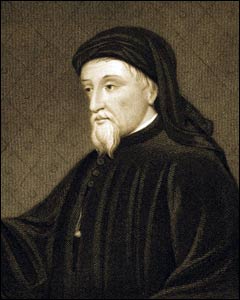
The Chaucer Page, by Anniina Jokinen, is a sub-area of her larger Luminarium Anthology of Middle English Literature, which covers several authors of the period. Here you will find a Chaucer Biography,
Chaucer's Works, Quotes, Essays and Articles, as well as links to study resources
and a list of books helpful for further study. All of these can be accessed from a
navigation bar at the top. A sidebar has links to medieval writers and works, historical
persons and events, and concepts relevant to the study of Middle English lyrics. Many
of these links lead to the Luminarium Encyclopedia. There is also a Chaucer Discussion Board where one can chat and ask questions.
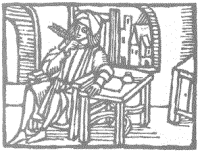
The Chaucer Pedagogy Page, by Daniel T. Kline of the University of Alaska in Anchorage, provides online assistance
for teachers and students of Chaucer and the Later Middle Ages, including Kline's
Electronic Canterbury Tales. It includes three sections, including a Chaucer Pedagogy Quick Start reference section,
a Chaucer Pedagogy Site Map, and Online Networking for Chaucer Teachers and Students.
This page is a collection of sites organized under a dialogue format according to
the questions that teachers and students of Chaucer might ask; in response, it directs
them to pages and sites that help to provide answers. The links include many pages
of original material, such as Kline's own class notes and engaging ideas for assignments.

The purpose of the New Chaucer Society is to provide a forum for teachers and scholars of Geoffrey Chaucer and his age.
To advance such study, the Society organizes biennial international congresses of
Chaucerians, publishes the annual Studies in the Age of Chaucer (not online) and a semiannual newsletter, and supports such important projects as
the Annotated Chaucer Bibliography (an electronic version of which is available online).
Participation in NCS congresses is restricted to active members of the Society. This
official site is dedicated to the study of Chaucer in his period. It contains information
about the society (officers, membership, meetings), its journal , and links to other
Chaucer-related sites.
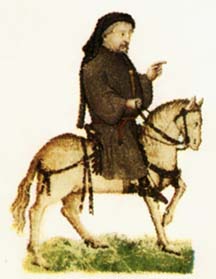
The Chaucer Review: An Indexed Bibliography is an online index to the 798 articles published in The Chaucer Review during its thirty years and two online abstracts of those articles. More than any
other resource, it provides a record of most of the significant trends in medieval
and Chaucer scholarship for the past three decades. The subject index is alphabetical,
its scope explained fully in the online introduction; the abstracts are arranged alphabetically
by author's last name and numbered sequentially. Head links allow one to jump to a
letter of the alphabet (for the index) or to a range of some 40 items (for the abstracts).
A search engine is promised.
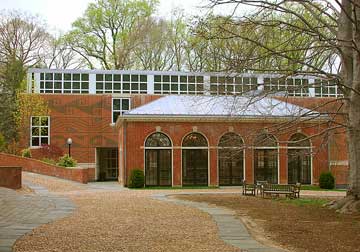
Dumbarton Oaks Research Library and Collection is an international center for scholarship, providing resources for study and publishing
scholarly works in Byzantine, Pre-Columbian, and Garden and Landscape Studies. Begun
as a private collection by Mildred and Robert Woods Bliss in 1920, and given to Harvard
University in 1940, the library and collections include art objects, artifacts, manuscripts,
and rare books. The house and collections have undergone renovations, and the garden
is open to the public.
![]()
The Electronic Bulletin of the Dante Society of America was founded in 1995 in the hope of offering, on the distant models of the Bulletino della Societ Dantesca Italiana (1889-1921) and of the Giornale Dantesco (1893-1940), an opportunity for the publication of brief notes (1,500 words or fewer)
concerning any and all matters relating to the study of Dante. Our desire is to encourage
discussion and debate among Dante scholars by publishing new work that deserves a
first airing. Since our electronic format allows the editorial board both to respond
to and to publish submissions quickly, publication is possible more rapidly than in
any forum devoted to Dante of which we know.

The French of England website, jointly supported by Fordham University in New York City and by the University
of York, UK, facilitates access to material centering on the French documents of England:
partial or complete translations of previously untranslated and unpublished work,
and research not yet published. The site welcomes today's newer approaches in, for
example, post-colonial and feminist studies, which seek to cross, realign, or even
erase disciplinary boundaries, and addresses scholars' questions about the ways in
which "French" texts might be "English" and about the interrelations between insular
French literature and that of the continent.
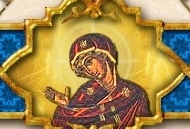
The Hilandar Research Library and Resource Center for Medieval Slavic Studies, is housed at The Ohio State University. The Hilandar Research Library (HRL) has
the largest collection of medieval Slavic manuscripts on microform in the world. Its
millions of folia of manuscript material on microform from more than 100 different
private, museum, and library collections in dozens of countries are utilized by scholars
from all over the world. Founded in 1984, the Resource Center for Medieval Slaiv Studies
(RCMSS) is an independent center of The Ohio State University College of Humanities
and is dedicated to the promotion of medieval Slavic Studies. It fosters and supports
research and collaboration in medieval Slavic languages, linguistics, history, and
culture. The RCMSS maintains particularly close ties, as well as sharing space with,
the Hilandar Research Library.
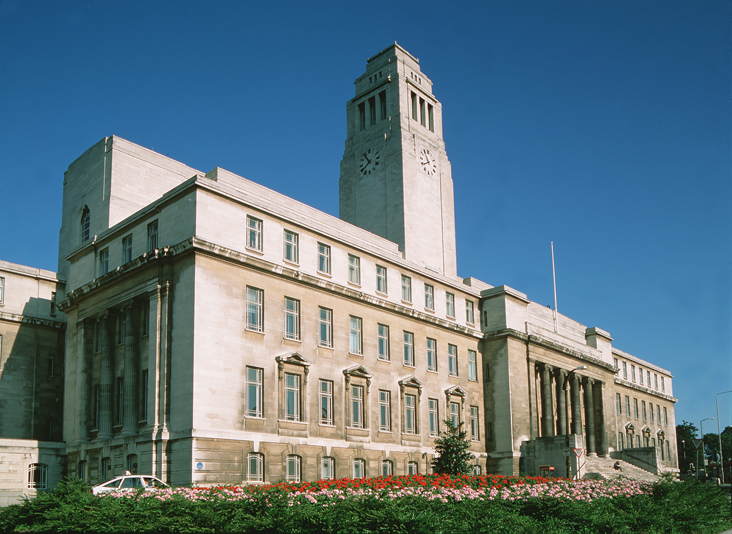
The Institute for Medieval Studies at the University of Leeds, renowned worldwide for the quality and range of its teaching and research, and for
a unique combination of resources, is special as a place for study of the Middle Ages.
The Institute brings together medievalists from across the University of Leeds and
beyond to form a community of scholars working on the societies and cultures of the
European and global Middle Ages. With one of the largest research libraries in the
United Kingdom, housing more than 2.7 million books, a fine journal collection, and
extensive holdings in all areas of medieval studies, with a rich and expanding store
of manuscripts and rare books, the Institute is home to the International Medieval
Congress, Europe's largest annual gathering of medievalists, and the International
Medieval Bibliography, the world's leading interdisciplinary bibliography of the Middle
Ages. The nearby archive of the Yorkshire Archaeological Society also has large medieval
holdings.
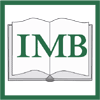
The International Medieval Bibliography (IMB), established in 1967, is the leading interdisciplinary bibliography of the
Middle Ages. It is produced by an editorial team at the University of Leeds and some
30 contributors word wide. It covers periodical literature and miscellany volumes
published in Europe, North America, Australasia, Brazil, Japan, and South Africa.
The printed IMB appears twice a year, covering most recent publications.

The Yorkshire Archaeological Society exists to promote the study of Yorkshire's historical past. It was founded in 1863
(as the Huddersfield Archaeological and Topographical Association) to promote interest
in the history and archaeology of the Huddersfield area. In 1870, it expanded its
interest to cover the whole of Yorkshire, and today it is the main society in this
field for the historic county. Throughout its history the Yorkshire Archaeological
Society has been active in publishing articles on many aspects of Yorkshire’s past
and transcripts of important Yorkshire records.
![]()
The International Center of Medieval Art (ICMA) is a world-wide organization dedicated to the study of medieval art and culture.
Founded in 1953 in France as the Centre International d'etudes Romanes and reestablished
in 1956 in New York, the ICMA has members in twenty countries worldwide. Its international
membership of academics, museum professionals, collectors, and enthusiasts of the
art of the Middle Ages is vital to its mission. The purposes for which the ICMA was
formed are to promote and encourage the study, understanding, and appreciation of
the visual arts of the Middle Ages produced in Europe, the Mediterranean region, and
the Slavic world, during the period between ca. 300 and ca. 1500 C.E.; and to this
end to sponsor and otherwise support study, teaching, conferences, exhibitions, displays,
and publications devoted to medieval art and culture.
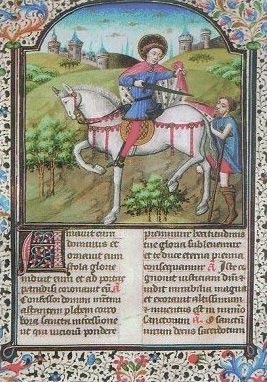
The International Medieval Congress (IMC) is organized and administered by the Institute for Medieval Studies at the
University of Leeds. Since it began in 1994, the conference has established itself
as an annual event with an attendance of more than 2,200 medievalists from all over
the world. It is the largest conference of its kind in Europe. Drawing medievalists
from more than 50 countries, with more than 1,900 individual papers and 630 academic
sessions and a wide range of concerts, performances, readings, roundtables, excursions,
book fair, and associated events, the Leeds International Medieval Congress is Europe's
largest annual gathering in the humanities.

The Internet Medieval Sourcebook, located at the Fordham University Center for Medieval Studies, makes available a
wide range of medieval texts that address elite governmental, legal, religious, and
economic concerns, as well as a large selection of texts on women's and gender history,
Islamic and Byzantine history, Jewish history, and social history. It has been constructed
from available public domain and copy-printed texts comprised of two parts: one, fairly
short classroom-sized extracts, and the other, full documents or World Wide Web links
to the full documents. The Sourcebook is specifically designed for teachers to use
in teaching by pointing students to this website; by downloading the documents, and
printing or Xeroxing them for distribution in course packets or as class handouts;
and by creating syllabi and course outlines at local websites with links to the documents
here.

Iter, meaning a journey or a path in Latin, is a not-for-profit research project with
partners in Toronto (the headquarters), New York City, and Tempe, Arizona. Iter was
created for the advancement of learning in the study and teaching of the Middle Ages
and Renaissance (400-1700) through the development and distribution of online resources.
A gateway to the Middle Ages and the Renaissance, Iter includes a massive, retrospective,
online medieval and Renaissance bibliography covering all languages and disciplines
(partnered with the Renaissance Society of America and the University of Toronto).
It is a powerful research tool that allows users to do the following: perform keyword
and phrase searching and use Boolean, positional, and relational operators; for selected
records published since 1990, search by subject, using Library of Congress subject
headings, Dewey Decimal Classification, and additional keywords; use hypertext links
to perform subsequent searches from results pages; and limit searches by language,
publication type, and publication date.
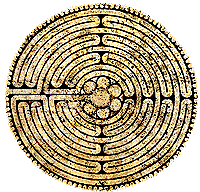
The Labyrinth: Resources for Medieval Studies, a disciplinary server for medieval studies, is an excellent resource that offers
free, organized access to electronic resources in medieval studies through a World
Wide Web server at Georgetown University. The Labyrinth's easy-to-use menus and links
provide connections to databases, services, texts, and images on other servers around
the world. This project not only makes available an organizational structure for electronic
resources in medieval studies but also serves as a model for similar, collaborative
projects in other fields of study. The Labyrinth project is open-ended and is designed
to grow and change with new developments in technology and in medieval studies.

The Medieval Academy of America (MAA) is the largest organization in the United States promoting excellence in the
field of medieval studies. It was founded in 1925 and is based in Cambridge, Massachusetts.
Its goal is to support research, publication, and teaching in medieval art, archaeology,
history, law, literature, music, philosophy, religion, science, social and economic
institutions, and all other aspects of the Middle Ages. The Academy publishes the
quarterly journal Speculum and awards prizes, grants, and fellowships, such as the Haskins Medal, which is named
for Charles Homer Haskins, one of the founders of the Medieval Academy and its second
president. Membership is open to all persons interested in the Middle Ages. The Academy
holds an annual meeting each spring.
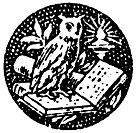
The Committee on Centers and Regional Associations (CARA) developed from organizations active in the 1960's (e.g., ACOMARS headquartered
at Ohio State) and became a standing committee of the Medieval Academy in 1969 to
serve as a forum for those who are concerned with the administration of institutes,
graduate centers, undergraduate programs and committees, and research libraries; with
the organization of regional and local groups of medievalists; and with teaching.
CARA assists institutions and individual medievalists in meeting the challenges that
face medieval studies in the classroom, the library, and other institutional settings
locally and nationally. It supports those who work to develop special projects and
programs of instruction, local and regional networks of medievalists, and centers
of research and institutions in medieval studies. It is concerned with pedagogy at
all levels. Institutions and individuals who wish to support and enhance medieval
studies are invited to join CARA and participate in its meetings and programs. CARA's
mission is advocacy and problem-solving. To accomplish its purposes, CARA organizes
its own meetings as well as sessions at the annual meeting of the Medieval Academy
and at other meetings of medievalists. It compiles and disseminates information about
its constituent institutions and participates in international meetings of centers
of medieval studies. CARA publishes in the Medieval Academy's newsletter, on electronic
networks, and elsewhere the kind of information that medievalists find useful in their
work as teachers and as advocates of medieval studies in their schools, colleges,
universities, libraries, museums, or regional associations.

The Medieval Association of the Midwest (MAM) is a community of scholars spread across the Midwest area of the United States,
as well as interested scholars from Canada and other parts of the U.S. It was originally
founded as an interdisciplinary association to promote the study, criticism, research,
and exchange of ideas related to all aspects of the medieval period and to articulate
the specific needs of medievalists in the Midwest. Methods of achieving this purpose
might include faculty exchanges, inter-institutional cooperation, annual meetings,
the publication of a newsletter, and particular encouragement of young scholars. Along
with its own annual meeting, the society organizes sessions at the yearly International
Congress on Medieval Studies at Western Michigan University and the yearly Modern
Language Association meeting in the Midwest. MAM also publishes Nuntia (a semiannual newsletter) and Enarratio (a journal of original research on medieval studies).

The Medieval Association of the Pacific (MAP) is an organization of university faculty, students, and independent scholars
from around the Pacific Rim, including North America, Japan, Australia, and New Zealand.
Founded in 1966, MAP has a distinguished history of supporting interdisciplinary medieval
studies. MAP holds an annual conference that is open to scholars working on any aspect
of the global medieval world; one need not live in MAP's general target area to participate.
The Association also supports the development of emerging scholars with conference
travel grants and the Founders' Prize for the best graduate student papers delivered
at the MAP conference.

The Medieval Institute at the University of Notre Dame was founded in 1946, and promotes research and teaching
on the multiple cultures, languages, and religions of the medieval period. Offering
both undergraduate and Ph.D. programs, the Institute facilitates the activities of
the largest contingent of medievalists at any North American University. More than
eighty faculty medievalists, from thirteen different departments, create a vibrant,
interdisciplinary, intellectual community that sponsors frequent speakers, conferences,
and other events. The outstanding medieval studies library collection attracts researchers
from around the world.
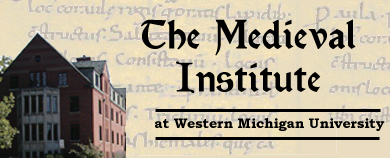
The Medieval Institute at Western Michigan University in Kalamazoo was established in 1962 as a center for
instruction and research in the history and culture of the Middle Ages. Its pioneering
function then was to introduce the first Master of Arts degree in medieval studies
offered at a state-supported university in the United States. Today, many decades
later, WMU remains one of the few public institutions in the country with an interdisciplinary
M.A. in medieval studies. The degree requirements are intended to provide graduate
students with the basic tools and skills necessary for specialized scholarly research
as well as with an understanding of and an appreciation for interdisciplinary aspects
of the study of medieval culture. The Medieval Institute ranks among the top ten of
the some 90 institutes, centers, and programs focusing on medieval studies in North
America. The Institute’s reputation primarily rests on its annual International Congress
on Medieval Studies, the largest annual professional meeting in the field, and Medieval
Institute Publications, which has published well over 200 books and journals since
1964.

The International Congress on Medieval Studies, the largest, most comprehensive academic conference of its kind in the world, is
an annual gathering of more than 3,000 scholars interested in medieval studies. Hosted
by Western Michigan University's Medieval Institute and taking place on the WMU campus
in Kalamazoo, it features around 600 sessions of papers, panel discussions, roundtables,
workshops, and performances. There are also some 100 business meetings and receptions
sponsored by learned societies, associations, and institutions. The exhibits hall
boasts nearly 70 exhibitors, including publishers, used book dealers, and purveyors
of medieval sundries. The Congress lasts three and a half days in May, extending from
Thursday morning, with sessions beginning at 10 a.m. until Sunday at noon.
![]()
Medieval Institute Publications (MIP) assumed its present structure in 1978 as the publishing arm of the Medieval
Institute at Western Michigan University in Kalamazoo, Michigan. It became a member
of the Association of American University Presses in 2011. Since 2015, MIP has been
working with Arc Humanities Press, which publishes scholarly research across premodern
interdisciplinary studies and cutting-edge work that links research into the past
with today's world. The publications series of MIP provide a space for exploring what
it has meant to be human through the ages, using literary, historical, and materials
sources and by employing innovative, popular, or interdisciplinary approaches. Its
publications explore themes in the late-antique, medieval, and early modern periods.
MIP publications are typically interdisciplinary and "edgy," in the sense of being
cutting edge, or crossing disciplinary, geographical, or chronological boundaries.

The Institute for Medieval Studies at the University of New Mexico offers a variety of Medieval Studies programs dedicated
to university and civic outreach, as well as to the enrichment of scholarship, teaching,
and research in the civilizations of medieval Europe and its neighbors from 500-1500.
Through special student opportunities and advanced research activities, and through
its links with graduate degree programs offered by UNM departments, the Institute
is committed to furthering the transmission and preservation of our rich heritage
from the Middle Ages. The Institute's programs operate under the philosophy that the
study of medieval culture provides a powerful vantage point from which to evaluate
our own and other cultures and to reflect on the complexity of human behavior and
institutions. Each year IMS hosts a week-long Spring Lecture Series that brings internationally
distinguished scholars to Albuquerque to make presentations on a set of topics organized
around a central theme. The IMS Director offers a biennial intensive summer course
in Paleography and Codicology that draws graduate students from across North America.
IMS has also developed an Outreach Program to the Secondary Schools, which has been
nationally and internationally recognized for its efforts to advance the study of
the Middle Ages in local high schools. The Institute is dedicated to furthering interdisciplinary
and multicultural work by challenging the conventional separation of existing intellectual
disciplines and by offering the broadest possible approach to research in the humanities.

The Online Medieval Sources Bibliography, created by the Center for Medieval Studies at Fordham University, is an annotated
bibliography of printed and online primary sources for the Middle Ages. This database
provides a searchable bibliography of texts--from private letters, wills, and household
accounts to literary works, philosophical treatises, chronicles, court proceedings,
church records, and a host of other documents--that were written in the Middle Ages
and are now available in printed or online editions and translations. The aim is to
provide annotated entries that include information on the genre, contents, archival
reference, and original language of the text, as well as whether the publication includes
a translation, introduction, appendices, glossary, and index. Where appropriate, the
bibliography also includes hyperlinks to sources that are online. The database is
currently weighted towards primary sources relating to England, France, and Ireland,
but more materials for other European countries are being added. The primary sources
included here date primarily from the period between roughly 300 and 1500, although
there are sources that date from before and after these years.

The ORB: On-Line Reference Book for Medieval Studies, maintained by the College of Staten Island, City University of New York, is an academic
site, written and maintained by medieval scholars for the benefit of their fellow
instructors and serious students. It includes a topical-index encyclopedia, a textbook
library of primary documents, a reference shelf guide to online textual resources,
a medieval studies guide for the nonspecialist, and external sites of interest to
ORB users.

TEAMS the Teaching Association for Medieval Studies, was originally founded as a committee
of the Medieval Academy of America to develop new ways to support the teaching activities
of its members. It was later reorganized as an independent nonprofit educational corporation
whose mission continues to be the support of teaching in medieval studies at the undergraduate,
secondary, and elementary school levels through the provision of resources and the
sharing of techniques. Its current programs include the publication of TEAMS Teaching
Texts in cooperation with Medieval Institute Publications, the maintenance of an online
library of Middle English texts, and the establishment of a committee for outreach
to secondary schools. It sponsors several sessions of papers at the annual International
Congress on Medieval Studies at Western Michigan University. TEAMS also publishes
a peer-reviewed electronic journal, The Once and Future Classroom: Resources for Teaching the Middle Ages in Grades K-12, and sponsors an annual teaching prize to recognize excellence in teaching medieval
studies in the K-12 classroom.

The Centre for Medieval Studies at the University of Toronto was envisaged by its founders not just as an institutional
umbrella for traditional departments but as a meeting point at which topics and issues
for multiple disciplines would be explored and studied in depth. Medieval Studies
in Toronto has an international reputation, resting on the wide-ranging interests
of its faculty, the caliber and preparation of its graduates, and its outstanding
library facilities. The Centre coordinates a program combining the resources of the
Pontifical Institute of Mediaeval Studies and of a wide variety of participating departments
and programs within the University of Toronto. The Centre also sponsors several major
research projects, and is home to a large body of scholars, numerous publication series,
and medieval drama and music groups. The Centre represents a large and highly interactive
community of professionals who work in widely diverse areas.
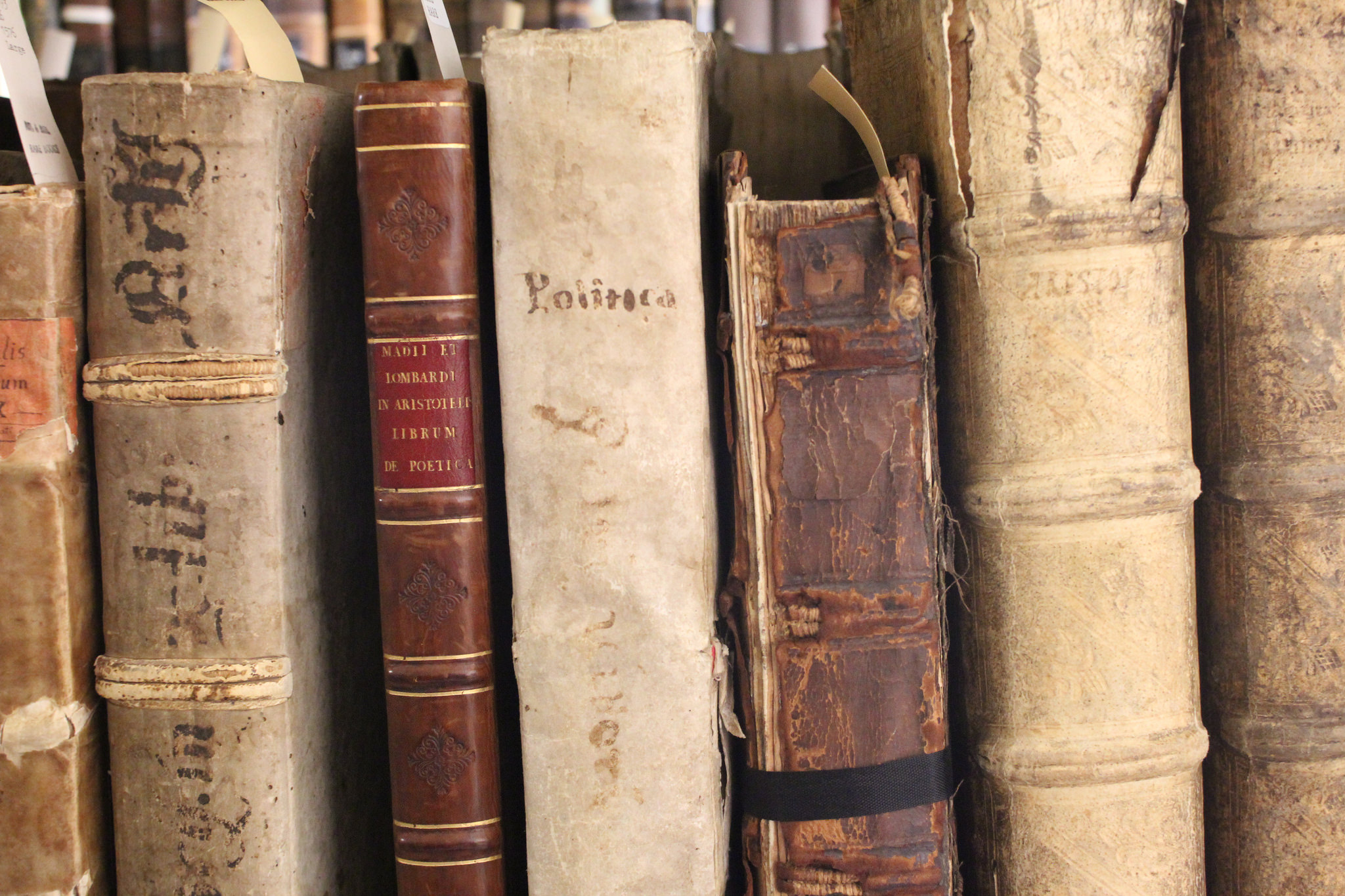
The Centre for Reformation and Renaissance Studies (CRRS) at Victoria University in the University of Toronto is a research and teaching
centre. The CRRS is a library devoted to the study of the period from approximately
1350 to 1700, supervises an undergraduate program in Renaissance Studies, organizes
lectures and seminars, and maintains an active series of publications. The CRRS library
collection of rare and modern books is devoted exclusively to the Renaissance and
Reformation periods.
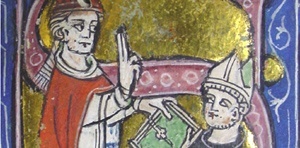
The Pontifical Institute for Mediaeval Studies (PIMS), at the University of Toronto, is Canada's oldest humanities research institute
for advanced studies in the intellectual and material cultures of the Middle Ages.
PIMS is dedicated to transmitting the inheritance of the Middle Ages to new generations,
and to deepening our understanding of the life and ideals of Western culture in the
time of its first youth. The Institute has concentrated on maintaining its new post-doctoral
Licentiate programme, which, with generous support from the Andrew W. Mellon Foundation
of New York, has proven itself an important adjunct to the training of young scholars;
on making its rich library resources available to medievalists from across the world;
and on continuing the vigorous publishing programme it began in 1955 through new and
enduring scholarship devoted to the Middle Ages.

The World Shakespeare Bibliography Online (WSB Online) is a searchable electronic database consisting of the most comprehensive record
of Shakespeare-related scholarship and theatrical productions published or produced
worldwide from 1960 to the present. The collected information is an essential tool
for anyone engaged in research on Shakespeare or early modern England.

Medieval Spell is an informational site about the history of medieval society such as medieval games,
castles, war, knights, games, houses, churches, and much more.
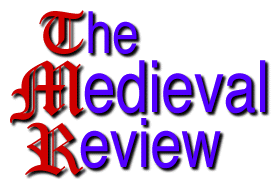
Since 1993, The Medieval Review (TMR) has been publishing reviews of current work in all areas of Medieval Studies, a field it interprets as broadly as possible. The electronic medium allows for very rapid publication of reviews and provides a computer-searchable archive of past reviews, both of which are of great utility to scholars and students around the world. TMR operates as a moderated distribution list. Subscribers receive reviews as e-mail. TMR posts each review as soon as the editors have received and edited it. There is no paper TMR. Once posted, reviews are archived and available for viewing, searching, printing, etc. on the website.

The Viking Society for Northern Research (VSNR) is the world's foremost learned society in the field of medieval Scandinavian
and Northern Studies. Its website offers excellent editions and translations of primary
Old Norse texts, and they are totally free to download as PDF files. The website also
has some great secondary sources free to download. VSNR publications and editions
of Old Norse texts have always been highly respected by the scholarly community, thereby
making the website a great resource for teachers who may want to keep textbook costs
low for their classes.
THE VIKING LANGUAGE SERIES
Jesse Byock's Viking Language 1 and Viking Language 2 are a must for those interested in Old Norse language, runes, Icelandic sagas, Viking history, and literature. Book 1 is a new introduction to Old Norse, Icelandic sagas, and runes. The beginner has everything in one book: graded lessions, vocabulary, grammar exercises, pronunciation, extensive maps, and sections on Viking history, literature, and myth. The innovative word-frequency method greatly speeds learning. Modern Icelandic has changed little from Old Norse; students are well on the way to mastering Modern Icelandic. Book 2 is a treasure trove of Scandinavian lore, immersing the learner in a wide variety of Old Norse sources and runes. The book offers a large vocabulary, chapters on eddic and skaldic poetry, and a grammar reference. The learner reads complete sagas, myths, creation stories, legends, runic inscriptions, and poems about Scandinavian gods, monster-slayers, dwarves, giants, and warrior kings and queens. The learner sets out on a journey deep into the Old Norse world. Both books have been reviewed by Thomas Shippey in Volume 22, Issue 2, of SMART. Also, visit the Jules Wiliams Press websites: www.oldnorse.org and www.vikinglanguage.com.



